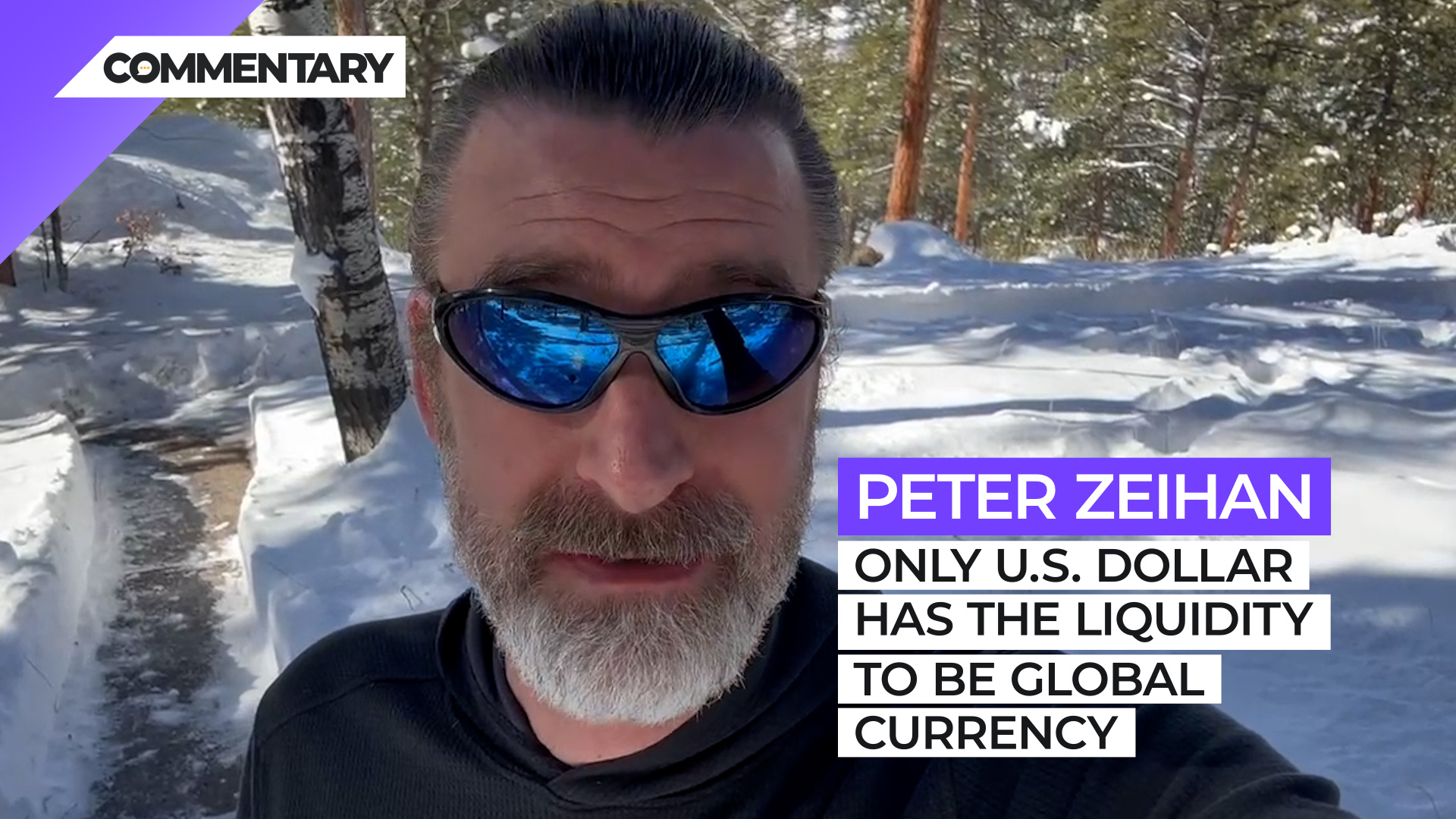
Commentary
-
Our commentary partners will help you reach your own conclusions on complex topics.
Everybody, Peter Zeihan here coming to you from Colorado where our eight inches of snow turned into 16 to 18. Because you know, mountains. Now, today, I wanted to talk to you about global currencies. Every few months, to a couple of years, a new conventional wisdom takes hold of the United States is in its final years, if not final months, and some big political thing is going to happen that is going to dethrone the US Dollar as the global currency. And all American power will unwind with that.
There is no part of that logic chain that has ever been correct. But these stories keep persisting because there is no shortage of people out there in the world who are anti-American and can’t do math and have no sense of history. So here we are one more time.
Step one, U.S. power is not a result of its position as the global currency, it’s the other way around. The global currency has to be able to impose by force if necessary, some sort of pacts on the trading system to allow trade to happen in the first place.
And right now, the US Navy is more powerful than that of all other navies combined by about a factor of seven. And if you consider that the world’s second and third most powerful expeditionary navies are the Japanese fleet and the British fleet, and you throw them in as American for this force production factor, you’re now talking in excess of 12 to one.
So honestly, there’s never been any math there. And there’s no danger to the US position from a strategic point of view. From an economic point of view, the idea is that people, countries will just stop using it. And the scuttlebutt of the moment is that a number of countries are negotiating, or at least talking about publicly, joining the BRICS group.
Now, BRICS is a group of four large developing economies, Brazil, Russia, India, and China. It’s a grouping that was put together by some finance guy back in the 2000s. And all he meant by it was, hey, look, these are four big countries with big bond markets, we might want to consider trading these as a group. That’s all he’s ever thought about it. But the leaders of the BRICS countries do get together from time to time to shop.
No meaningful policy has ever come out of it. Because these countries don’t really trade. I mean, they all trade with China, of course, but they don’t trade with one another. So there’s a reason to caucus with Beijing, but the rest of it is just kind of fluff, always has been. And so when I see stories about other countries, such as South Africa, or Argentina, or now Saudi Arabia, starting to join them like, this is really boring, because these countries really have nothing in common. But anyway, as the conspiratorial logic goes, if they stop using the US dollar then the US is doomed.
Well, they’d have to start using something else. And none of them, none of them, want to use each other’s currencies, because that would give that country a leg up. So like, you know, the Russians have always said that the ruble should be the global currency, which makes everyone, everyone laugh, because nobody wants rubles, especially Russians. And the same goes with the Chinese yuan. And the South Africans, for rand, and so on.
There’s an idea that you will have a jointly managed currency, something that’s maybe launched off of the International Monetary Fund’s secure deposits there, their SDS are what they call, but that’s not a currency, that’s not even a unit of exchange, that’s simply an accounting fiction that has been created. Because the money that comes into the IMF comes in from several dozen locations.
They need some sort of central accessing. In terms of volume, STS would have to expand by at least a factor of 1000, in order to manage global trade. And now we’re getting into kind of the guts of what you really need. If you want to have a global currency, it has to be huge, it has to be able enough to lubricate the Global Exchange mechanisms, which at last check was in the 10s of trillions.
And that doesn’t mean that your currency has to be in the 10s of trillions, that means you have to be able to lubricate the exchange of 10s of trillions. Your currency needs to be even bigger. Which gets us to probably the single biggest constraint on being a global currency. You have to not care what happens to the value of your currency on any given day. Because if there’s a trade surge and demand of your currency goes up, then all of a sudden the supply of your currency has plummeted, you’re dealing with very real economic distortions at home. So your currency has to be so huge that you don’t care that the global exchange rate is moving around every day.
And that means you also need to be able to run a persistent trade deficit, because you have to be able to provide currency for everyone who wants to trade everywhere at any time, and you cannot sign off on each individual transaction.
That makes the list down to one already, because the Europeans couldn’t do it because they have to run a trade surplus because their demographics are so age, they will never be net importers again. It can’t be the Chinese. The Chinese are the most manipulated currency in human history. They print two to five times as much currency every month as the US Fed did at the height of our monetization programs in 2007 to 2008 and then again during COVID.
It’s everything that everyone says is wrong with the US dollar is actually wrong with the yuan by a factor of 10 more. And every time the Chinese start to loosen up their capital controls in an attempt to have a bigger role for their currency internationally, a half a trillion to a trillion dollars of private savings floods out of the countries in a matter of months. And they have to slam that window shut again.
So there is no reason to expect the US dollar to go anywhere. In fact, let me put this in historical terms, the need to have a large liquid stable currency maintained by a country that doesn’t care what happens, whatever it is, is so huge. It’s so central to trade, that even at the height of the British Spanish confrontations in the late colonial period, the Brits were using almost exclusively Spanish currency to lubricate their slaves, rum finished goods, trade triangle between the Caribbean colonies, the American colonies and the British mainland.
Another good example, at the height of the Vietnam War, the Vietnamese were using the US dollar in their international exchange because there was no option. You want a more recent example, look at what’s going on with Russia. The Russians are under financial constraints right now – sanctions put on them by the Americans, the Europeans and others – and so they tried to pull a lot of their petroleum earnings, which comes in in euros and dollars, and they tried to push it into Chinese yuan as kind of a stick it to the west. Well, a few months later, they tried to then pull it out the Chinese like, Well, no, we really don’t want these Yuan back. And so the Russians just lost 10s of billions of dollars.
There is simply no example at any point through human history of the unit of exchange for global trade being that of anything other than the global hegemony and the largest economy writ large. It’s just not possible.
I don’t mean that to sound pro-American because the Americans have been on the other side of this. During the War of 1812, when the Brits were very close to destroying the United States as a country, our unit of exchange internally was the British pound. And if anything, as the world continues to be globalized, you should expect the American position to entrench because as global trade breaks down and goes into regional trade, you’re going to have a series of regional hegemonic who have tried to impose a bit of a pacts on their own neighborhood and they will try to force everyone in their neighborhood to use that currency.
But all of those countries will have a vested interest in not doing that. And as long as the US dollar is available, you’ve got a more liquid, less politically problematic currency that doesn’t swing wildly, that is not actively manipulated to achieve trade advantages. And that is going to be used instead. So I mean, for example, think about the eastern Mediterranean, we’re nearing a world where Turkey is going to be the central hub for all things in the caucuses and the Middle East and the eastern Balkans. They’re going to try to get everyone to use the lira. But not everyone is going to want to use it because the Turks will will will use that authority in order to bind all these other economies more closely to them. Anyway, like I said, at the very beginning, there’s no shortage of people who don’t like Americans who have no sense of math or history who are always going to trot this up every few months, and it means as little today as it did then. Alright, that’s it for me. Until next time.
-
Japan’s navy gets an upgrade
Following their defeat in World War II, the people of Japan pursued a largely pacifist foreign policy. Today, following Russia’s invasion of Ukraine and with near-daily news regarding China’s threatening activities throughout the greater Pacific, the Japanese are reinvesting in military defense and reaffirming their alliances with Pacific partners like Australia and the United States.…
-
How could RFK Jr. impact 2024 election?
Many Americans speculated about how a potential RFK, Jr. campaign might impact the 2024 elections. While RFK is neither a Democrat nor a Republican, many of his positions favor Donald Trump’s base over Joe Biden’s, particularly his various conspiracy theories on a wide range of subjects. Straight Arrow News contributor Peter Zeihan says that GOP…
-
Global warming won’t impact Russian-Chinese shipping
The seas above Russia’s northern coastline are too frozen for shipping, but some have wondered whether global warming might change that in the decades to come. If those seas were to become navigable for commercial shipping, new direct routes between Russia and China could theoretically open up. Straight Arrow News contributor Peter Zeihan throws more…
-
Can other nations replicate success of US shale revolution?
The “shale revolution” has provided the United States with a bountiful domestic supply of oil. But extracting oil from shale is a highly technical process, and it is also dependent on specific geological formations. Straight Arrow News contributor Peter Zeihan tackles the question of whether or not other nations might be able to replicate the…
-
Peace between Israel and Iran, at least for now
A series of recent airstrikes between Israel and Iran inflamed fears of a wider regional war erupting in the Middle East. That concern now seems to have paid off, after third-party countries around the world successfully intervened and talked down military hardliners in both Israel and Iran in order to avoid such an outcome. Israel’s…
Latest Stories
-
 Reuters
Reuters
Israel believes ICC is ready to issue arrest warrants over Hamas war
-
 The Metals Company
The Metals Company
Deep sea mining may end US reliance on China, enviro concerns remain
-
 Getty Images
Getty Images
Beijing auto show features next-gen EVs unavailable to US consumers
-
 Getty Images
Getty Images
USDA assures public retail meat is safe, still plans to test beef samples
-
 Getty Images
Getty Images
Study: Bottlenose dolphin tested positive for bird flu off Florida coast
Popular Opinions
-
In addition to the facts, we believe it’s vital to hear perspectives from all sides of the political spectrum.
Latest Opinions
In addition to the facts, we believe it’s vital to hear perspectives from all sides of the political spectrum. We hope these different voices will help you reach your own conclusions.
The opinions published in this section are solely those of the contributors and do not reflect the views of Straight Arrow News.

















Latest Commentary
We know it is important to hear from a diverse range of observers on the complex topics we face and believe our commentary partners will help you reach your own conclusions.
The commentaries published in this section are solely those of the contributors and do not reflect the views of Straight Arrow News.
Peter Zeihan
Geopolitical StrategistHow could RFK Jr. impact 2024 election?
Global warming won’t impact Russian-Chinese shipping
Can other nations replicate success of US shale revolution?
Dr. Frank Luntz
Pollster and Political Analyst‘Take the job seriously’: Why Americans are fed up with Congress
‘If we can shrink it, it will stop growing’: Americans talk debt, deficit
‘I don’t think they care’: Undecided voters explain their reasons
Pete Ricketts
U.S. Senator for Nebraska